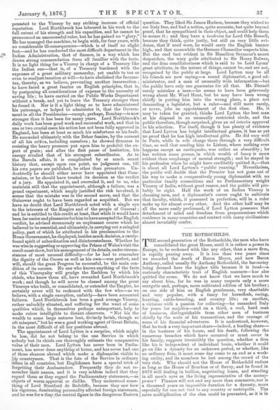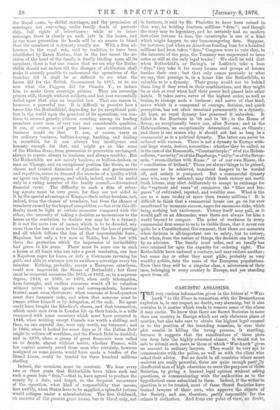THE ROTHSCHILDS.
THE second generation of the Rothschilds, the men who have consolidated the great House, until it is rather a power in Europe, to be reckoned with like any other, than a mere firm, is rapidly passing away. It is less than two years since we recorded the death of Baron Meyer, and now Baron Anthony, called usually Sir Anthony Rothschild, the baronetcy being deemed here the higher title because it is local—a curiously characteristic trait of English manners—has also quitted the scene. We do not know that we have much to say about him, for he was in many respects only a more energetic and, perhaps, more cultivated edition of his brother; on one side of him an English gentleman' very charitable and very popular, with a fancy for horseflesh, racing, hunting, cattle-breeding, and country life ; on another, a virtuoso with a passion for collecting—he ransacked Italy for years for majolica—and on a third, a cool, hard man of business, distinguishable from other men of business chiefly by the scale of his transactions, and the courage of some of his financial adventures. It is understood, however, that he took a very important share—indeed, a leading share-- in the business of his house, and his death, following the numerous breaches which have occurred or must occur in his family, suggests irresistibly the question, whether a firm like his is independent of individual brain, whether it could go on like a dynasty for an unknown period, or whether, like an ordinary firm, it must some day come to an end as a work- ing entity, and its members be lost among the crowd of the very rich. Why should not the House of Rothschild endure as long as the House of Bourbon or of Savoy, and be found in 2876 still dealing in bullion, negotiating loans, and standing in all men's eyes as the living representative of the money- power ? Finance will not end any more than commerce, nor is a thousand years an impossible duration for a dynasty, more especially for one not tied to any country or metropolis. The mere multiplication of the clan could be prevented, as it is in the Royal caste, by skilful marriages, and the permission of marriages not conveying, under family deeds of partner- ship, full rights of inheritance ; while as to inter- marriage, there is clearly no such rule in the house, and in one more generation its heads will be no nearer in blood than the members of a dynasty usually are. With a firm ad- herence to the royal rule, said by tradition to have been established by Baron Nathan, that in the last resort the de- cision of the head of the family is finally binding upon all its members, there is but one reason that we see why the Roths- childs should not endure till the changes of civilisation shall make it scarcely possible to understand the operations of the founder, till it shall be as difficult to see what the house did for the British Government in 1815, as to see now what the Fuggers did for Charles V., to induce him to make them sovereign princes. They are sovereign princes, still, though without subjects, and last year successfully defied upon that plea an imperial law. That one reason is, however, a powerful one. It is difficult to perceive how a house like the Rothschilds', depending for its exceptional posi- tion in the world upon the grandeur of its operations, can con- tinue to succeed greatly without counting among its leading members some man of very rare and considerable qualities. It can, of course, avoid great losses ; mere contraction of business would do that. It can, of course, carry on its ordinary business, bullion-buying, banking, and dealing in securities, for it can always buy intelligence and honesty enough for that, and might go on like some of the Hindoo firms, from generation to generation unchanged, always in repute, always in business, and always wealthy. But the Rothschilds are not merely bankers, or bullion-dealers, or men on 'Change, and an exceptional position like theirs, as the chosen and trusted financiers of dynasties and governments and republics, seems to demand the exercise of a quality which no agent can fully possess, and which, indeed, could be useful only in a ruling member of the family council,—determined financial nerve. The difficulty in such a firm of select- ing agents must be very great, for they are not aided in it by the special advantage of Kings,—their entire freedom, not, indeed, from the chance of treachery, but from the chance of treachery caused by the hope of competition ;—but even this dif- ficulty must be light at certain moments compared with the other, the necessity of taking a decision as momentous to the house as the resolution to declare war may be to a dynasty. It is not the mere loss of money which is to be dreaded, any more than the loss of men in the battle, but the loss of prestige and all which follows the loss of that imponderable force., Napoleon lost only a few men at Maida, but he lost with them the protection which the impression of invincibility had given to his arms. There must be some one in such a house at all times who can take a great resolution, can face a Napoleon eager for loans, or defy a Commune ravening for gold, and able to sentence you to swallow a sovereign every ten minutes. Nothing, probably, except a European cataclysm, could now impoverish the House of Rothschild ; but there must be recurrent occasions like 1815, or 1832, or, in a supreme degree, 1848, or 1866, or 1870, when early information, keen foresight, and endless resources would all be valueless without nerve ; when agents and correspondents, however trusted, mnst seem chatterers; when someone at head-quarters must dare immense risks, and when that someone must be owner, either himself or by delegation, of the cash. No agent could have bought the Khedive's shares, and that transaction, which made men even in London lift up their hands, is a trifle compared with some occasions which must have occurred in 1848, when nothing except Consols was worth a shilling, and they, on one especial day, were only worth, say tenpence ; and in 1866, when it looked for some days as if the Italian Debt might be written off worthless, and the French Debt be doubled and in 1870, when a group of great financiers were called on to decide, almost without notice, whether France, with her capital scarcely saved from men who certainly, however maligned on some points, would have made a bonfire of the Grand Livre, could be trusted for three hundred millions sterling.
Indeed, the occasions must be constant. We hear every two or three years that Rothschilds have taken such and such a great loan "firm,"—that is, have agreed to produce the money by a date, and forget, in the frequent recurrence of the operation, what kind of responsibility that means, how swiftly, when States have to be supplied, a splendid fortune .wo.uld collapse under a miscalculation. The filet Goldsmid, an ancestor of the present great house, but in blood only, not in business, is said by Mr. Picciotto to have been ruined in that way, he holding fourteen millions " firm" • and though the story may be legendary, and he certainly had no modern fast-class fortune to lose, the catastrophe is one of a kind which might happen to any loan-mongering firm. Suppose, for instance, just when an American funding loan for a hundred millions had been taken "firm," Congress were to vote that, in the interests of the poor, the Treasury was empowered to issue notes at will as the only legal tender We shall be told that when Rothschild's, or Baring's, or Laffitte's take a loan "firm," they take it for many houses and groups of houses besides their own ; but that only comes precisely to what we say, that prestige is, to a house like the Rothschilds, as valuable as to a dynasty. Their group would not be behind them long if they erred in their combinations, and they might be as rich as ever when half their power had passed into other hands. It takes nerve nerve of the highest order, as well as brains, to manage such a business ; and nerve of that kind, nerve which is a compound of courage, decision, and quick perception, has not often remained permanently in a dynasty. At least, no royal dynasty has possessed it unbroken. It failed in the Bourbons in '98 and in '48; in the House of Savoy, an exceptionally brave one, after Novara; and in the Hohenzollerns,*an exceptionally determined one, at Ohnutz ; and there is one reason why it should not last as long in a commercial as in a political dynasty. The latter can never be satiated with success. There is not a dynasty in Europe with- out huge wants, desires, necessities ; whether they be called, as in the case of the Romanoffs, " Constantinople ;" or of the Hohen- zollerns, "security;" or of the Hapsburgs," unity;" or of the Savoy- ards, "reconciliation with Rome ;" or of our own House, the "conciliation of Ireland." There are always things to be gained, successes to be achieved, imminent dangers to be warded off, and satiety is postponed. But a commercial dynasty may win, may be satiated, may think fresh victory not worth fresh labour, may elect deliberately to accept in exchange for the " raptures and roses" of commerce the "lilies and lan- guors " of cultivated, reputed, and wealthy ease. What is the use to a man to-day of more than twenty millions ? It is difficult, to think that a commercial house can go on for ever unsoftened by immense success, eager for enormous risks, which bring nothing but excitement. Victory itself may pall, as it would pall on an Alexander, were there not always for him a world beyond to conquer. The point of weakness in every commercial firm seems to us to be visible there, that it never can quite be a Constitutional Government, that there are moments when decision is all-important not to safety, but to victory, and when, from the nature of things, the decision can be given by no advisers. The family must order, and no family has ever retained for ages the capacity for ordering right. The Rothschilds have endured a century, and may endure another; but some day or other they must glide, probably as very wealthy nobles, into the mass of the European populations. Even then they will be a singular class, a microcosm of their race, belonging to every country in' Europe, and yet standing apart from all.



































 Previous page
Previous page